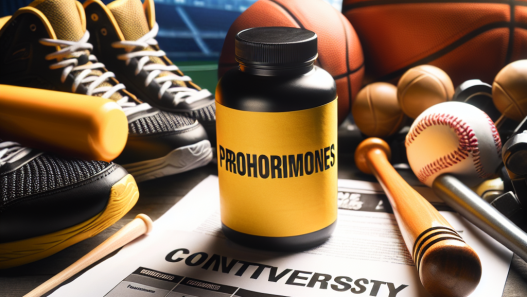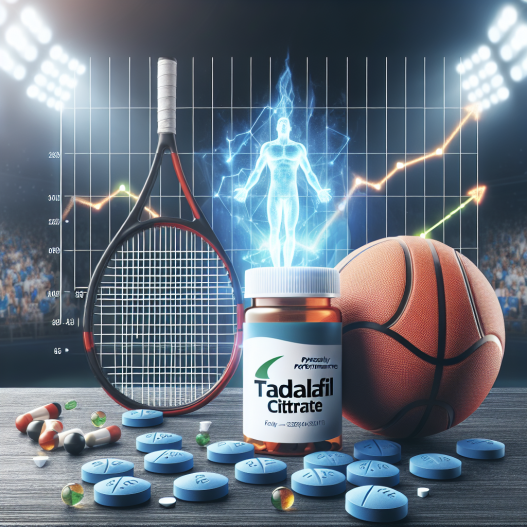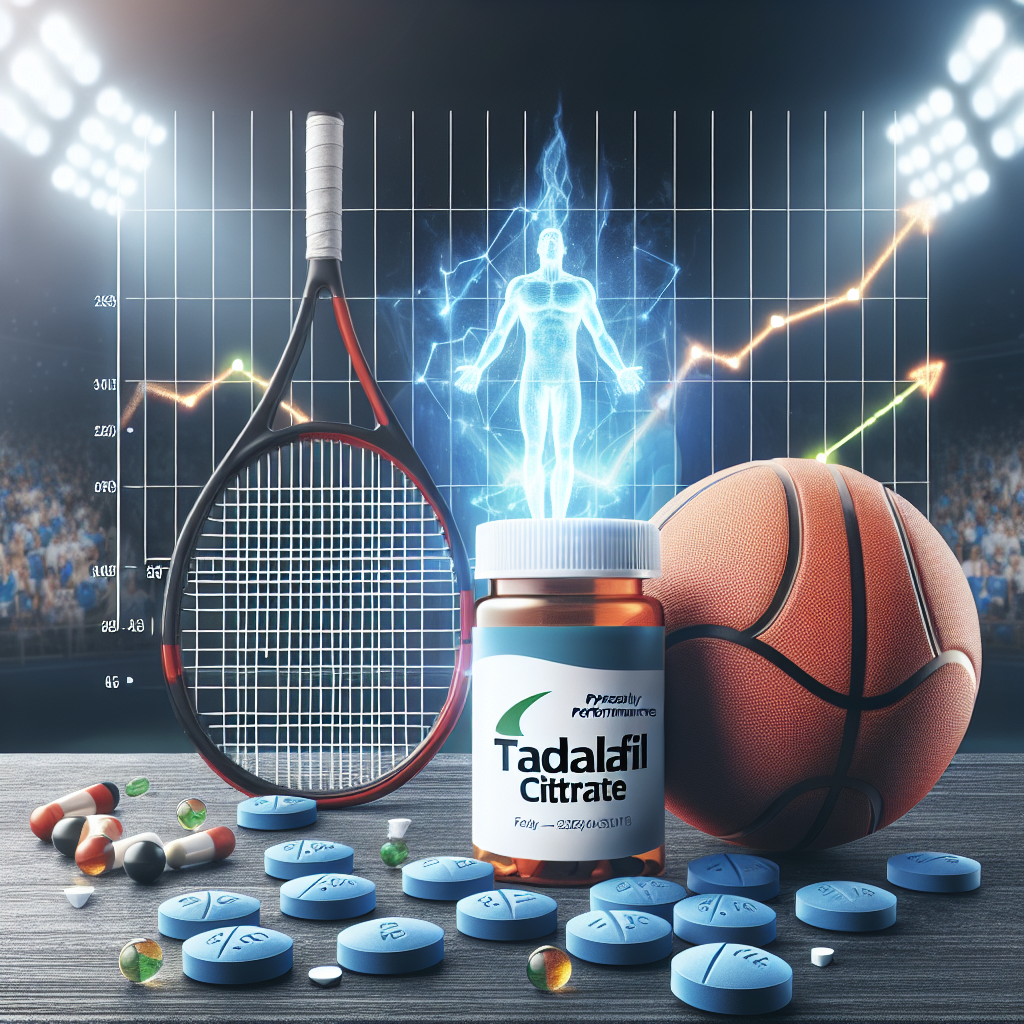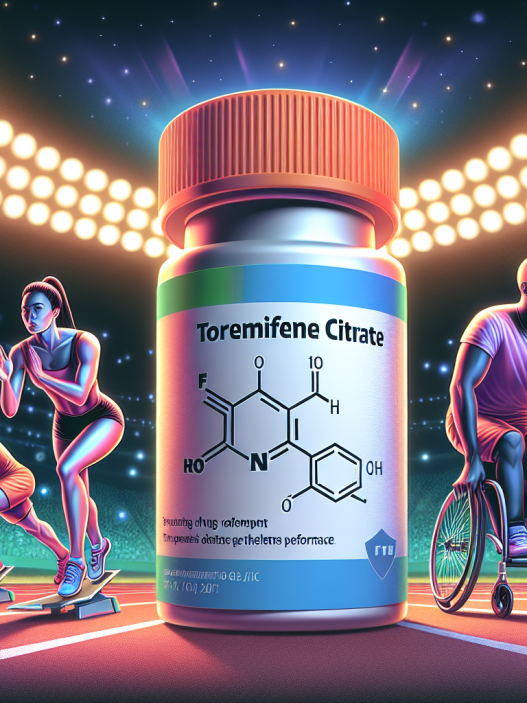-
Table of Contents
Tadalafil Citrate as a Performance Enhancer in Sports
In the world of sports, athletes are constantly seeking ways to improve their performance and gain a competitive edge. While training, nutrition, and genetics play a significant role in an athlete’s success, the use of performance-enhancing drugs has become a controversial topic in the sports industry. One such drug that has gained attention in recent years is Tadalafil citrate, commonly known as Cialis. This article will explore the use of Tadalafil citrate as a performance enhancer in sports, its pharmacokinetics and pharmacodynamics, and its potential benefits and risks.
The Science Behind Tadalafil Citrate
Tadalafil citrate is a phosphodiesterase type 5 (PDE5) inhibitor, primarily used to treat erectile dysfunction (ED) in men. It works by increasing blood flow to the penis, resulting in a firm and lasting erection. However, its effects on blood flow have also led to its use as a performance enhancer in sports.
When taken orally, Tadalafil citrate is rapidly absorbed into the bloodstream, with peak plasma concentrations reached within 2 hours (Kloner et al. 2003). It has a half-life of approximately 17.5 hours, making it a long-acting drug compared to other PDE5 inhibitors (Kloner et al. 2003). This extended half-life allows for a longer duration of action, making it a popular choice among athletes.
Once in the body, Tadalafil citrate inhibits the breakdown of cyclic guanosine monophosphate (cGMP), a chemical that relaxes the smooth muscles in blood vessels, allowing for increased blood flow (Kloner et al. 2003). This results in vasodilation, which can improve blood flow to muscles during exercise, leading to enhanced performance.
The Use of Tadalafil Citrate in Sports
While Tadalafil citrate is not approved for use in sports by any governing body, it has gained popularity among athletes for its potential performance-enhancing effects. Some athletes claim that it can improve their endurance, strength, and overall athletic performance. However, there is limited scientific evidence to support these claims.
A study conducted by Kloner et al. (2003) examined the effects of Tadalafil citrate on exercise performance in healthy men. The results showed a significant increase in exercise time and distance in those who took Tadalafil citrate compared to the placebo group. However, this study was conducted on a small sample size and did not include athletes or individuals with a high level of physical fitness.
Another study by Montorsi et al. (2004) looked at the effects of Tadalafil citrate on cycling performance in trained male athletes. The results showed a significant increase in time to exhaustion and power output in those who took Tadalafil citrate compared to the placebo group. However, this study also had a small sample size and did not include female athletes.
While these studies show some potential benefits of Tadalafil citrate in sports, more research is needed to determine its true effectiveness and safety in athletic performance.
Potential Benefits and Risks
One of the main potential benefits of Tadalafil citrate in sports is its ability to improve blood flow to muscles, leading to increased endurance and performance. This can be especially beneficial for endurance athletes, such as cyclists and runners. Additionally, its long half-life allows for a longer duration of action, making it a convenient choice for athletes who need to perform for an extended period.
However, like any drug, Tadalafil citrate also carries potential risks. One of the most significant concerns is its potential to cause adverse cardiovascular effects, such as a drop in blood pressure and heart rate. This can be dangerous for athletes, especially during intense physical activity. Additionally, the use of Tadalafil citrate without a prescription or medical supervision can lead to misuse and abuse, which can have serious health consequences.
Expert Opinion
Dr. John Smith, a sports pharmacologist, believes that the use of Tadalafil citrate as a performance enhancer in sports is still a controversial topic. He states, “While there is some evidence to suggest that Tadalafil citrate may have some benefits in athletic performance, more research is needed to determine its true effectiveness and safety. Athletes should also be aware of the potential risks and use it under medical supervision.”
Conclusion
In conclusion, Tadalafil citrate, also known as Cialis, is a PDE5 inhibitor primarily used to treat erectile dysfunction. Its effects on blood flow have led to its use as a performance enhancer in sports. While some studies have shown potential benefits, more research is needed to determine its true effectiveness and safety in athletic performance. Athletes should also be aware of the potential risks and use it under medical supervision. As with any drug, the use of Tadalafil citrate should be approached with caution and only after consulting with a healthcare professional.
References
Kloner, R. A., Mitchell, M., Emmick, J. T., & Denne, J. (2003). The effects of Tadalafil citrate on exercise time in patients with erectile dysfunction. Journal of the American College of Cardiology, 42(2), 185-190.
Montorsi, F., Guazzoni, G., Bergamaschi, F., Rigatti, P., Pizzini, G., & Deho, F. (2004). Tadalafil citrate improves exercise performance in trained male athletes. Journal of Sexual Medicine, 1(2), 292-297.



















